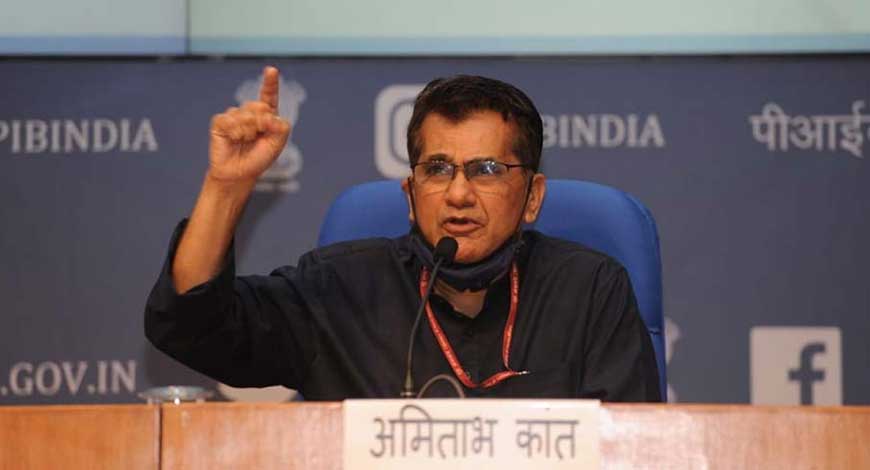Headlines of The Day
Indian startups disrupting the world, says NITI Aayog

Indian startups are using public digital infrastructure to innovate fast and roll out new and complex financial products, NITI Aayog chief executive officer Amitabh Kant said at the Mint Start-Up Icon Awards 2022.
Startup founders and their dynamic teams are showing unique energy to grab every growth opportunity and are disrupting conventional ways of doing business across industries, Kant said at the event on Friday. According to him, low-cost internet data plans, a talented pool of professionals, widespread phone usage and policy support given by the government have aided the growth of startups.
Startups play a key role in Prime Minister Narendra Modi’s economic growth strategy as this segment would create new skilled jobs and help address the challenge of jobless growth and loss of low-skilled jobs to automation in the industry.
Kant sees startups as a great job creating sector, even as they pave the way for India to enter sunrise areas of growth, whether it is battery production or electric vehicles, which the government is supporting with schemes such as production-linked incentives. “The Indian startup movement has a very unique energy, vibrancy and dynamism, which you will not find in any of the established players,” Kant said, adding that startup founders, their dynamic teams and their financiers are the real change-makers.
According to Kant, the extent of innovation taking place and the pace of growth in the startup segment is massive. “The number of domestic patent registrations has shot up from 12,000 in 2015-16 to 25,000 in 2020-21. It shows innovation has grown massively,” he said.
In addition, Kant said many startups are getting unicorn status fast.
“In the past three months, we created 11 unicorns. Actually, we are creating 3-4 unicorns every month. They are solving many of the challenges India is facing,” Kant said.
“For them, the market is not just 1.3 billion people. As you solve these problems, you are finding a market of next 5-6 billion people who will move from poverty to middle class,” said Kant.
According to Kant, the momentum of the ‘startup India’ initiative that started around 2016 has exceeded expectations. “It has been a phenomenal story,” he said. In the past few years, the Indian startup ecosystem has not only matured but has grown by leaps and bounds, Kant said.
“In 2016, there were just a handful of startups. There was very limited support available in terms of investments, incubators and accelerators, and the landscape was very different at that point in time. Since then, we have emerged as one of the most vibrant ecosystems in the world,” Kant said.
“We have grown to become—many people say the third-largest—but I truly believe we are the second largest (startup) ecosystem in the world today. To date, we have close to 67,000 startups that are officially recognized by the Department for Promotion and Internal Trade. This has been a tremendous journey because concerted efforts have been made to provide all institutional support critical for laying the foundation of this ecosystem built over the years,” Kant said.
Prime Minister Modi had in January said that startups were changing the demographic characteristics of today’s business as 44% of the recognized startups have women directors and a high number of women working in them. Also, 45% of startups are in smaller cities, working as brand ambassadors of the local products.
The support given to startups includes a simple registration process, tax incentives for three years, eligibility for participating in government tenders and reducing patent filing costs. India’s digital infrastructure has helped cement the country’s position in the global startup landscape, Kant said.
“This digital infrastructure is critical. The lowest cost data plans in the world are in India. That has enabled a very high level of penetration of smartphone devices. Digital connectivity has given a massive amount of fillip to the startup movement in India,” said Kant.
He said public digital infrastructure facilities such as Aadhaar authentication and Unified Payments Interface (UPI), an instant real-time payment system developed by National Payments Corp. of India, has allowed government, businesses and startups to offer a vast range of financial services.
“This is catapulted the behaviour of cashless transactions. If you look at Unified Payments Interface, digital UPI payment has become a way of life for millions. Eighty per cent of transactions in Unified Payments Interface is actually peer-to-peer. That reflects in a major way the replacement of cash in India,” he said.
With the payment problem solved, the industry’s focus has shifted to lending and then to offer new services in personal finance, money management, investments and trading. He said a plethora of top-class startups have come up in this space.
“What we are now witnessing is the emergence of financial products, which target the more complex segments—for instance, the new insurance tech companies. Startups are simplifying insurance greatly,” Kant said, adding that the fintech ecosystem is poised to leapfrog as it caters to the aspirations of the 1.3 billion-plus Indians.
“The entire process of vaccination has been digital. As we now move towards a digital health identity for every Indian, you will have a unique platform on the back of which many of you will innovate. We will be creating new ways to solve the health challenges in the country,” Kant said.
“The Indian startup ecosystem can solve any challenge facing India today… I am sure startups will get into many new and emerging areas and make India a global champion in all of these areas,” Kant said. LiveMint












